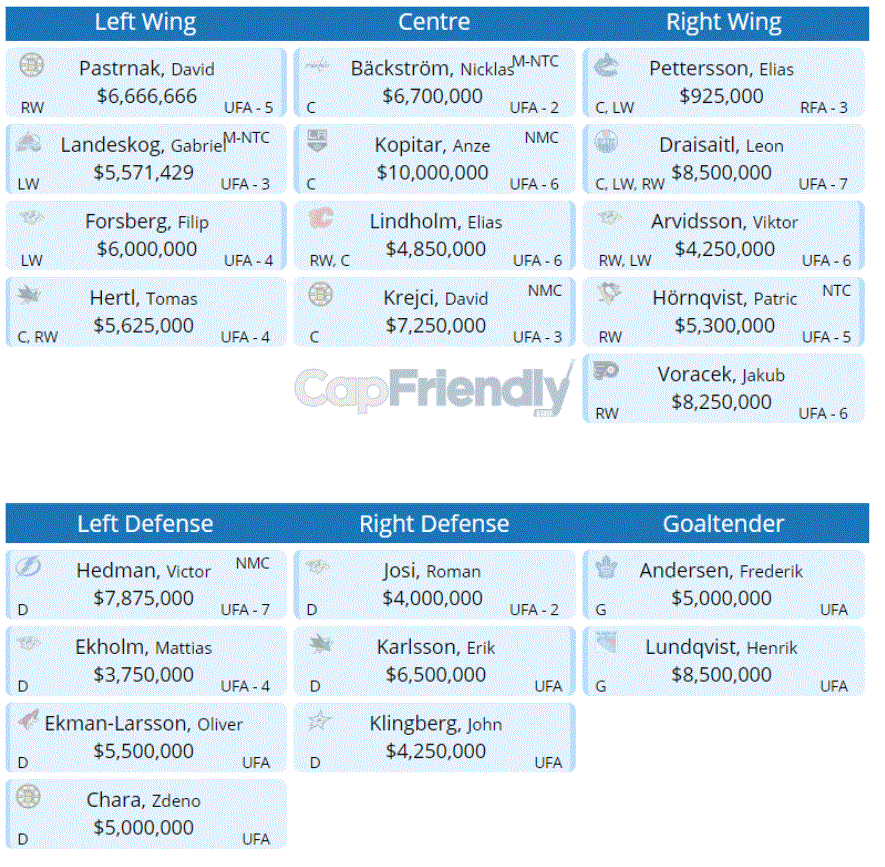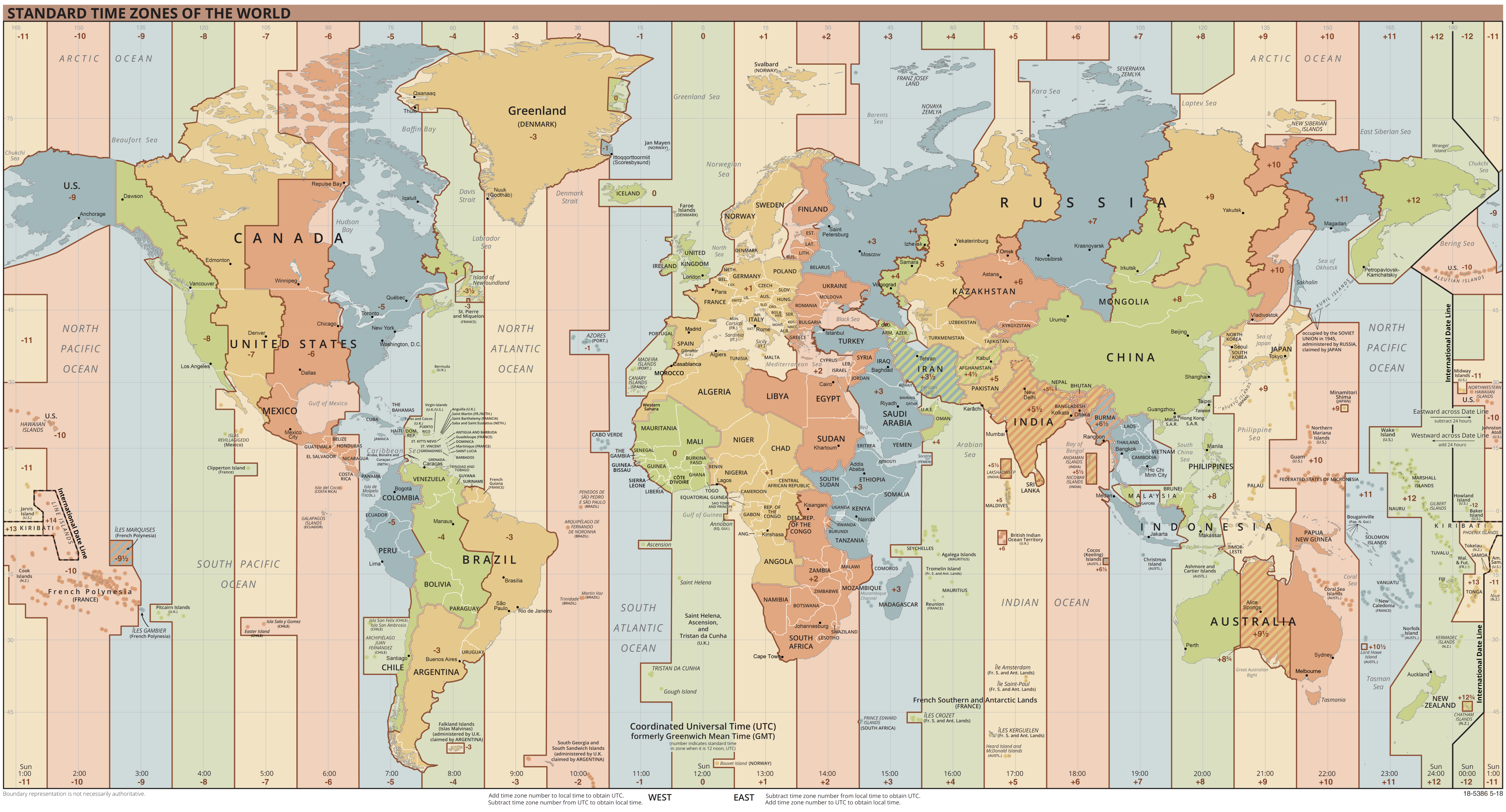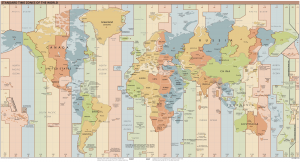*If you already read Parts I, II, III and IV of this article, skip down to where it says “UTC +1.”
Sports are generally fun. Reality is generally not as fun. Sports in the context of reality are fluctuating levels of fun and not as fun. Since I do not consider myself a masochist, I try to write fun stuff. And you know what’s fun? Making teams that are unlikely to exist, that are selected based on handpicked, whimsical parameters, and pitting them against each other.
After the wonderful writers at The Athletic went to the painstaking measures of projecting teams for Canada, the United States, Sweden, Russia, and Finland at the 2020 World Cup of Hockey, it was announced days later that the World Cup of Hockey is, at present, not happening. The 2014 Olympics feel like a decade ago, and meaningful international hockey does not look to be on the cards anytime soon. One cool concept introduced at the more relaxed 2016 World Cup was Team North America. Made up of the best 23-and-under players from the US and Canada, stars like Connor McDavid and Johnny Gaudreau joined forces to offer fans a glimpse into the NHL’s bright future. And with pieces being written recently by Sean McIndoe that aimed to field the best and worst teams possible using existing contracts, I started thinking. Thus, the Great Ice Hockey Time Zones World Cup was created.
National borders are so arbitrary, and yet we stage the biggest sporting events in the world (among other things) based on them. International hockey tournaments with NHL talent have always been played on tilted ice, with Canada winning three of the five Olympics in which players from the senior circuit have partaken. The US has closed the gap on Canada recently, but with Russia still developing talent using Soviet-era training methods and Finland, Sweden and others not quite having the depth to match the North American nations due to their smaller populations, it doesn’t seem that parity is nearby. It would be more intriguing to play a tournament with the people that celebrate New Years’ simultaneously with you. That’s right—forget national allegiances. On hockey’s biggest stage (soon—trust me), the sport’s foremost superstars will be suiting up for teams like “Coordinated Universal Time (acronym UTC—no idea how) negative six.” If you weren’t always friendly with middle school geography, here’s a map of the time zones.
The appeal is simple—we’re trying to break up the Canadian juggernaut by taking advantage of how much sheer landmass the True North spans, but we’re giving them the American studs directly south to add star power. Fortunately for us, the time zones in Canada are actually pretty nicely split down the borders of the provinces, so that sense of hometown pride will burn extra strong. I thought that we would run into an issue with the Scandinavians. Fear not, though—Sweden and Finland are actually in different time zones as well! The Finns do get the short end of the stick in that Sweden is aided by nations such as the Czech Republic in UTC +1, while Russia has no players of note until UTC +3, leaving our small but mighty nation of some five million stuck in the middle in UTC +2.
A conditional: it may have gleefully occurred to you, “Oh boy, Russia is SCREWED!” The world’s largest nation by landmass has already been struggling to churn out top young talent relative to previous levels for a few years now, and it spans eleven f*cking time zones! To level the playing field, I split Russia in two—Russia West will be the players hailing from UTCs +3 and +4 near Europe, while Russia East will be comprised of the legends in UTC +5 and east—from basically Siberia to holy-shit-that’s-actually-still-Siberia.
Finally, tragically, it is with much grief that I share with you that neither Sidney Crosby nor Nathan MacKinnon—probably two of the best five players in the world—will be part of this exercise. Both grew up in the province of Nova Scotia in Canada (population 950,000, UTC -3). There have only been a few dozen NHL players from Nova Scotia in history, and there are less than ten active players. Plus, if I added UTC -3 players to the UTC -4 team, well, this really wouldn’t be a contest at all. Other than that, however, one of the attractive features of the GIHTZWC is that every top player in the world besides Crosby and MacKinnon are on a squad. Players that generally wouldn’t get a chance to really compete for a medal, like Frederik Andersen of Denmark and Leon Draisaitl of Germany, will be surrounded with the types of teammates that will have them playing every match-up tight.
Global time zone supremacy is on the line. As a resident of UTC -4 (Eastern Standard Time) my whole life, I’m finally ready to lord over the hockey universe, with a little help from McDavid and John Tavares. Let’s break down the teams—lineups, strengths, weaknesses, and more—and find out where the best distance to live from the Prime Meridian is once and for all!
UTC +1 (Czech Republic, Denmark, Germany, Slovakia, Slovenia, Sweden, Switzerland)

You might have seen this one coming. The fact that Sweden and Finland lie in different time zones prevents a true European superteam, but fortunately for the Swedes, all the Central European countries producing NHL talent fall inside of time zone UTC +1.
Two of the NHL’s most promising European forwards in Pastrnak and Pettersson team up on the first line with Backstrom, who will feed them the puck to no end. The jumbo-sized line of Landeskog, Kopitar, and Draisaitl will give the +1s as physical a trio as we’ll see, while Elias Lindholm centers Predators wingers Forsberg and Arvidsson on an all-Swedish third line.
The calling card of the Swedish national team has always been their defense, and we leave the back end to them, with a little help from Swiss Roman Josi. A trio of ultra-smooth right-handed shots in the aforementioned Josi, Erik Karlsson, and John Klingberg pair with steadier lefties, but there’s really nothing any of these D-men can’t do well. Dane Freddy Andersen’s impressive display so far with the Leafs gives him the nod over Henrik Lundqvist in net. That being said, the King will be more than able to step in if needed.
Thanks to their dominating presence on the +1s defense, we have 13 Swedes on our squad. However, it’s hardly a homogeneous crew. There are only 13 Swiss, 7 Danes, 10 Slovaks, and 6 Germans in the league, but each country is represented here, while Anze Kopitar, the only Slovenian currently in the NHL, will surely play a prominent role. Point being, while NHL teams aren’t forking out money to every Bob, Dick, and Harry plying their trade overseas, if you’re good enough, they’ll find you. That’s reflected in the quality of this team.
I’d argue this team is our second-favorite after the UTC -4s. In fact, the gap might not be all that big. Unlike virtually every other team, the +1s are able to field players throughout their defense that can neutralize opposing teams’ top offensive threats and then seamlessly jump into the rush. Andersen and Lundqvist in net means the +1s can ride whomever’s been on their game, unlike the -4s, who will almost definitely have to lean on Fleury. Still, there’s just not quite enough in the forwards to peg the +1s as the team to beat, which is not an indictment of their talent but rather a testament to the stunning -4s group, who have top-thirty or so players at all twelve spots up front.
But what about all the other great time zone-based teams? I will be breaking down the whole world of hockey over the next few days, so make sure to visit the Georgetown Voice for updates. Next on the list is UTC +2 (Finland). Who will be placed on this team? How good will they be? Check back in tomorrow to find out.




[…] The Great Ice Hockey Time Zones World Cup: UTC +1 The Georgetown Voice […]